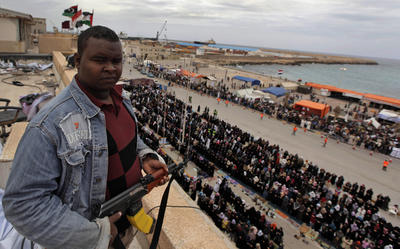NATO and its partners are using air strikes on Gaddafi’s forces to protect civilians, but it is far from clear if NATO is going to prevail anytime soon in the absence of ground forces. What is going on in Libya is a revolution, but there is nothing flowery about it.
The Libyan imbroglio raises a wider point about international intervention in a domestic conflict. As understood by the United Nations, the Responsibility to Protect (R2P) is not a law but a norm on which states can act legitimately. It is based on three principles.
First, each individual state has the primary responsibility of protecting its own population from genocide, war crimes, ethnic cleansing and crimes against humanity. Second, the international community has a commitment to assist states to build up their capacity to protect their populations from these horrors. Third, the international community has a responsibility to take timely and decisive action to prevent or halt mass atrocities when it is clear that a state is failing to protect its own people.
These admirable principles seek to strike a balance between the sovereignty of states and the human rights of citizens. The aim of R2P is to help states protect their people; but when states turn on their own citizens, the rest of the world has the responsibility to protect them. States cannot hide behind sovereignty to declare war on their own citizens and get away with it.
It is to the credit of the UN — and Canada and the African Union in particular — that the 21st century has this norm. The genocide in Rwanda horrified then UN Secretary-General Kofi Annan, who wanted to see what the world could do to prevent such atrocities in the future. What was needed was a new mechanism in international relations.
Canada, which is in the forefront of much progressive thinking on global issues, demonstrated its leadership by establishing the International Commission on Intervention and State Sovereignty. The African Union came together to declare that the international community has a responsibility to intervene in situations like Rwanda.
But there are complications, too, with the R2P norm, as the Libyan crisis is revealing.
First, there is the question of legitimacy. In the Libyan case, the Arab League approved and the UN Security Council supported the enforcement of a no-fly zone over Libya. But critics argue that the real purpose of the intervention is regime change, which means the international coalition will continue with its military offensive till Gaddafi steps down.
This is true. The Libyan strongman had accepted an African Union peace plan that would have led to a ceasefire and the suspension of NATO airstrikes. The rebels rejected the plan. The fighting continued. So does NATO intervention — until, presumably, regime change takes place.
But does, and should, the R2P norm entail regime change? In the aftermath of the Iraq War, this is a legitimate question to ask. In the Libyan case, the brutality of the state’s initial response to the protest justified implementing R2P. But when the rebels rejected a solution that would have ended the horrors, wherein lies the purpose of continuing R2P?
Second, there is the issue of double standards.
‘If Libya, then why not Yemen and Bahrain?’ David Hillstrom asked in a recent Foreign Policy Journal article. ‘The answer is obvious … Bahrain is an ally for the West and action against the regime there would result in the strengthening of the Shi’ite majority and shift power in the region towards Iran. Such is the moral bankruptcy of real politik.’
He has a point, though diluted by the fact that the state suppression of protests in Bahrain, Yemen and even Syria, while harsh, did not come close to the Libyan horrors. But the point is, like any other international norm, R2P is a political one — and politics, in a far-from-perfect world, will never be free of double standards.
But having said that, the international community should make R2P less open to manipulation by powerful countries.
Hillstrom argued correctly that if the UN wishes to make R2P a legally binding principle, it should initiate broader discussions that lead to a consensus codified in a written legal document. ‘The framework for such a process is not in place and without such a framework all future decisions will similarly be ad hoc,’ he wrote. ‘This is not a prescription for international justice.’
What is needed, then, is consistency in the application of R2P — a benchmark for judging both the actions of states against their citizens, and the actions of powerful states against others. At present, it is a good norm in search of fairness.
K. Kesavapany is director of the Institute of Southeast Asian Studies. He is also Singapore’s Non-Resident Ambassador to Jordan.
This piece was originally published in The Straits Times 20 April 2011.


I cannot agree with Mr. Kesavapany’s conclusion. Consistency is a goal too far for R2P. Any situation in which R2P is an issue will be complex and full of enormous uncertainties. Decisions by countries on how to vote when an R2P case is brought to the United Nations, or on how and when to intervene, will necessarily reflect political judgments based on as many different reasons as there are countries. The only realistic approach is to treat every case as UNIQUE and not let consistency stand in the way of protecting civilians from being slaughtered when intervention appears to have crossed the threshold of minimum feasibility. These are also situations where the perfect is the enemy of the good. It is not realistic to expect a global consensus in any R2P case.